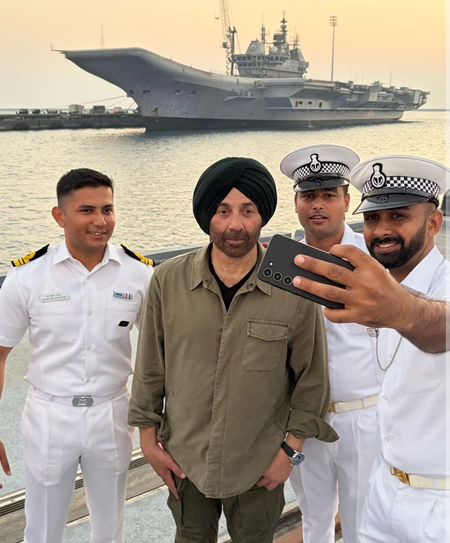
Mumbai, Feb 18 (IANS) A Friday is the day when a new film releases in India. The exhibition trade plans its calendar of 52 weeks according to Fridays. Box Office is the term that gets bandied around. The entire film industry awaits positive box-office returns starting every Friday. That is where the wealth is created, the wealth that refuels the industry and keeps it going.
A cinema is the vehicle that carries your films to the people. Earlier, the word was masses, but because of the kind of exhibition trade that exists now, the word masses can no longer be used. Masses included people from all strata of society and gave a film the initial fillip. Watching a film was affordable and these masses made provision to watch a new film every Friday or during the weekend.
The multiplex culture has put paid to the aspirations of the masses, yet the kind of films that are made these days are more likely to attract masses — they come loaded with action and computer-generated special effects that also help make heroes look much younger than their 55 years or so.
Talking of 50-plus actors, they were never a deterrent for the people to watch a film. Stars such as Raj Kapoor, Dev Anand and Dilip Kumar continued to work into their 50s. With much younger heroines at that! There were no computers to make them look younger and they did not need them either.
But then, thanks to special effects, even the romantic heroes have taken to action films. The fact is, an action hero is readily accepted in a romantic film, but it doesn’t work when a romantic hero switches character.
Dharmendra, who was dubbed the ‘He Man’, carried the image of an action hero, but gave his most successful films with romantic or social themes. The same was true of Vinod Khanna and Amitabh Bachchan.
In more recent times, Salman Khan’s career was launched as a romantic hero, he did some social films (the Rajshri Pictures kind) and even played a second fiddle to Jackie Shroff in ‘Bandhan’. He was equally at ease with a comedy like ‘Judwa’, but when he came up with an action film, ‘Wanted’, he was readily accepted. The film went on to become a major hit and Salman was slotted as an action hero.
Now, all in all, the scene in the production of films is quite muddled. If Shah Rukh Khan thinks action films will further his career, Hrithik Roshan does a ‘Super 30’, a real life story! To add to the irony, during the promotion of the film, the real life character of the story is also brought in along with a 6-foot tall, fair and handsome Hrithik who plays the lead. Why darken his face and give him a beard and spoil his looks! That was not necessary, really. And Punjabi lyrics and tunes for the theme and background of the film!
This amounts to taking your audience for granted. If you want to take such liberties, you have to create a convincing situation for that. Like Manmohan Desai did in film after film. Besides, the makers don’t only lift sequences, especially action, from Hollywood films, but they even write their script and dialogues in English.
As a Bihar exhibitor puts it, we are just trying to ape Hollywood and distanced the masses from movie going! Our makers have become ‘angrez’, he adds. He believes the makers need to revisit the 1990s and not only make films like they made in those days, but also recall the directors of that era.
He cites the example of ‘Gadar 2’ and Anil Sharma who could come out with a super hit even now. He questions why Hrithik and Shahid Kapoor’s films don’t get initial footfalls, while a virtually unknown Teja Sajja’s ‘HanuMan’ does well. What good are the multi-crore charging Hindi stars?
Some makers think it is chic to have the film peppered with English dialogues. And they are the same as when you are watching a Hollywood film. When not, a lot is lost in the translation. Where are those claptrap one-liners that the dialogue writers penned in the past!
This overdose of computer-generated action films, lifted from Hollywood, don’t seem to excite our viewers anymore.
The other day, I happened to watch Ajay Devgn’s film ‘Runway 34’. I have watched hundreds of films for professional reasons, but this one lacked story sense, logic and therefore any appeal it could have had. A passenger plane pilot boasts of his experience of flying hours to a comparatively new co-pilot and defies all advice and odds to land his flight in a storm-struck city.
Much of what you see in this film was already done and dusted in the 1970 Hollywood film, ‘Airport’, and many other such films, not to forget popular TV shows based on air disasters that have been running on various channels since 2003. The concept and execution was poor, at best.
Can someone explain to me this craze to produce Hollywood films and also try to do better than them?
What, then, is the situation at present? People are rejecting just about every aspect of the film trade, from admission rates to the kind of films being made.
The cinemas are the place where it shows. There is no audience and, hence, no collections. (Unless, the maker or the star of the film concerned has the capacity or the knack to show the crores of business the film never did!)
There are multiplex properties and there are privately owned single screens. The latter are not built on public funding. The multiplex properties are rented spaces; single screens are not.
The most worried lot are the single screen owners. Here are the laments of some. There is this theatre owner from Muzaffarnagar, Uttar Pradesh. He invested Rs 4 crore to build a new cinema in 2020. He recounts how poorly films are faring, adding that he built the cinema with his own money, but had he depended on bank loans, he would have been finished by now.
The show tax that the local government levies used to be Rs 20, but it has now been raised to Rs 500 per show. Now, Ravi Teja’s film ‘Eagle’ collected just Rs 400, which was not enough to cover even the show tax, let alone electricity, staff and projection costs.
As for ad revenue, who gets it? In the good old days, there were agencies that booked ads for cinemas. I remember Blaze was the pioneer in the field. The understanding was practical. The agency got its commission while the rest went to the cinema. Now, the cinemas pay for power bills and the rest while the entire ad revenue is gobbled up by the distributor.
The 3D films they make, like ‘Fighter’, need the updation of bulbs that costs almost Rs 2 lakh more than what is required for 2D projection.
Then there’s this former filmmaker from Mumbai who is the cinema controller of two theatres in Hyderabad and one in Aurangabad. He should be happy because he does not depend on Hindi films alone. Sadly for him, even the recent South Indian films have proved to be letdowns.
Two major films, Ravi Teja’s ‘Eagle’ and Mahesh Babu’s ‘Guntur Kaaram’, have failed to sustain. One would think that these booking agents working on behalf of cinemas had nothing to lose if a film did not work. But they do. They lose both prestige and the contract.
The advent of multiplexes coupled with cockeyed policies of the various state governments sounded the death knell for single screens, which actually drew and catered to the masses.
Now, the impractical admission rates and poor cinema content are bound to tell on the survival of both, the single screens as well as the multiplexes. So get back to Indian themes like in the good old days.
These computer heroes are failing even in Hollywood. There was a generation that was brought up on the American culture of comic books and Marvel spun the best superhero fantasies at that time.
Finally, what about release strategies? Last Friday we had just one film out in the theatres. But on March 1, as many as seven films have been lined up for release. This at a time when even one film is not capable of drawing crowds.
Soon, there will be many obstacles for films. Exam season, IPL24, general elections and Ramzan. These spells many black Fridays in the offing.
–IANS
vinod/srb




